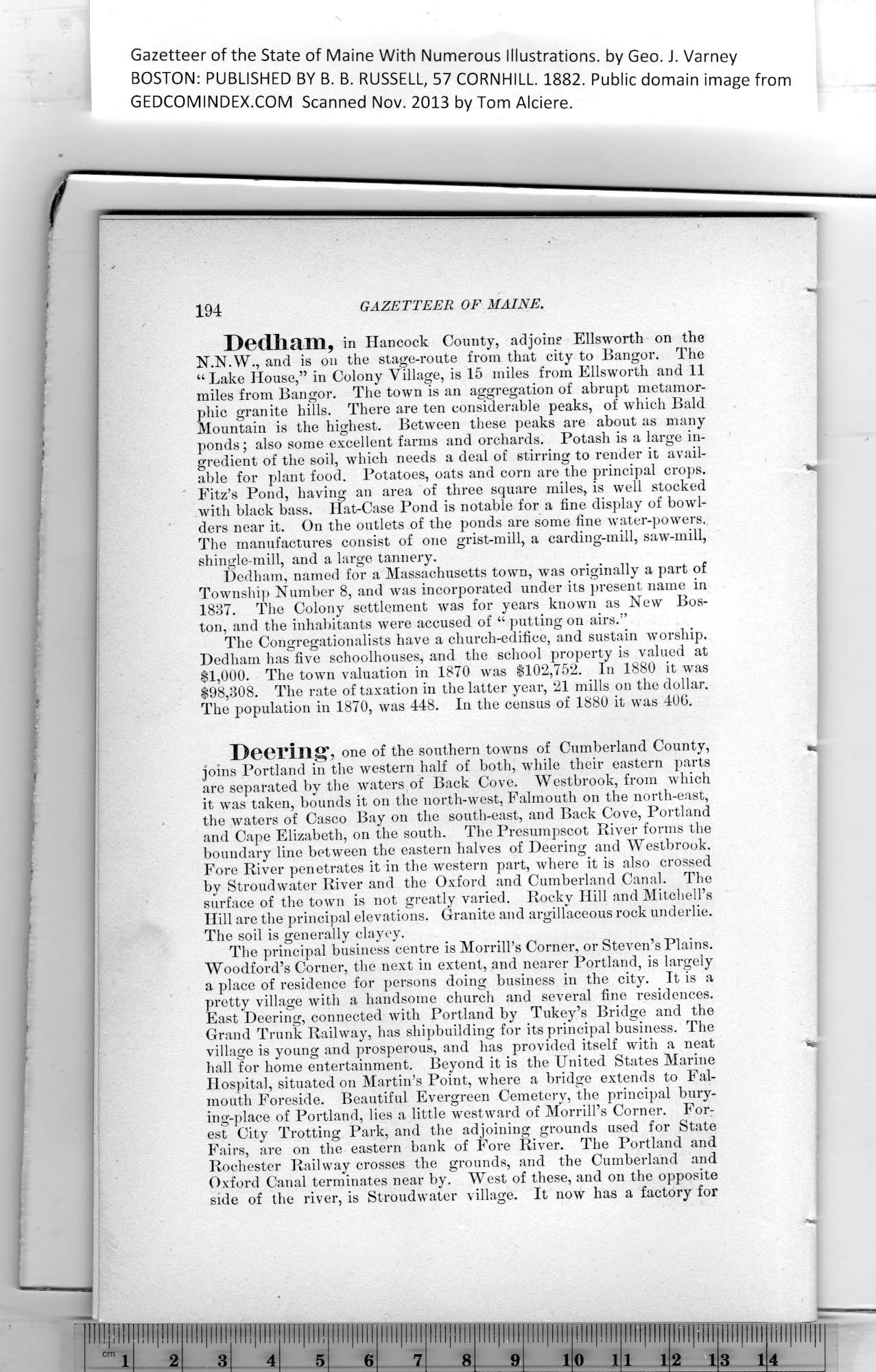|
Gazetteer of the State of Maine With Numerous Illustrations, by Geo. J. Varney
BOSTON: PUBLISHED BY B. B. RUSSELL, 57 CORNHILL. 1882. Public domain image from
194 GAZETTEER OF MAINE.
Dedham, in Hancock County, adjoins Ellsworth on the
N.N.W., and is on the stage-route from that city to Bangor. The
“ Lake House,” in Colony Village, is 15 miles from Ellsworth and 11
miles from Bangor. The town is an aggregation of abrupt metamor-
phic granite hills. There are ten considerable peaks, of which Bald
Mountain is the highest. Between these peaks are about as many
ponds; also some excellent farms and orchards. Potash is a large in-
gredient of the soil, which needs a deal of stirring to render it avail-
able for plant food. Potatoes, oats and corn are the principal crops.
Fitz’s Pond, having an area of three square miles, is well stocked
with black bass. Hat-Case Pond is notable for a fine display of bowl-
ders near it. On the outlets of the ponds are some fine water-powers.
The manufactures consist of one grist-mill, a carding-mill, saw-mill,
shingle-mill, and a large tannery.
Dedham, named for a Massachusetts town, was originally a part of
Township Number 8, and was incorporated under its present name in
1887. The Colony settlement was for years known as New Bos-
ton, and the inhabitants were accused of “ putting on airs.”
The Congregationalists have a church-edifice, and sustain wTorship.
Dedham has five schoolhouses, and the school property is valued at
$1,000. The town valuation in 1870 was $102,752. In 1880 it was
$98,808. The rate of taxation in the latter year, 21 mills on the dollar.
The population in 1870, was 448. In the census of 1880 it was 406.
Deering, one of the southern towns of Cumberland County,
joins Portland in the western half of both, while their eastern parts
are separated by the waters of Back Cove. Westbrook, from which
it was taken, bounds it on the north-west, Falmouth on the north-east,
the waters of Casco Bay on the south-east, and Back Cove, Portland
and Cape Elizabeth, on the south. The Presumpscot River forms the
boundary line between the eastern halves of Deering and Westbrook.
Fore River penetrates it in the western part, where it is also crossed
by Stroudwater River and the Oxford and Cumberland Canal. The
surface of the town is not greatly varied. Rocky Hill and Mitchell’s
Hill are the principal elevations. Granite and argillaceous rock underlie.
The soil is generally clayey.
The principal business centre is Morrill’s Corner, or Steven’s Plains.
Woodford’s Corner, the next in extent, and nearer Portland, is largely
a place of residence for persons doing business in the city. It is a
pretty village with a handsome church and several fine residences.
East Deering, connected with Portland by Tukey’s Bridge and the
Grand Trunk Railway, has shipbuilding for its principal business. The
village is young and prosperous, and has provided itself with a neat ^
hall for home entertainment. Beyond it is the United States Marine
Hospital, situated on Martin’s Point, where a bridge extends to Fal-
mouth Foreside. Beautiful Evergreen Cemetery, the principal bury-
ing-place of Portland, lies a little westward of Morrill’s Corner. For-
est City Trotting Park, and the adjoining grounds used for State
Fairs, are on the eastern bank of Fore River. The Portland and
Rochester Railway crosses the grounds, and the Cumberland and
Oxford Canal terminates near by. West of these, and on the opposite
side of the river, is Stroudwater village. It now has a factory for
PREVIOUS PAGE ... NEXT PAGE
This page was written in HTML using a program written in Python 3.2
| 